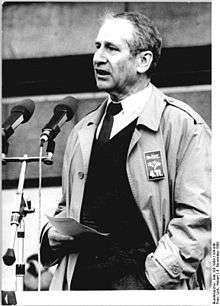Markus Wolf
| Markus Wolf | |
|---|---|
 Markus Wolf | |
| Born |
Markus Johannes Wolf 19 January 1923 Hechingen |
| Died |
9 November 2006 (aged 83) Berlin |
| Nationality | German |
| Other names | Mischa |
| Spying career | |
| Allegiance | East Germany |
| Service | General Intelligence Administration (Hauptverwaltung Aufklärung) |
| Active | 1953–1986 |
Markus Johannes "Mischa" Wolf (19 January 1923 – 9 November 2006) was head of the Main Directorate for Reconnaissance (Hauptverwaltung Aufklärung), the foreign intelligence division of East Germany's Ministry for State Security (MfS, commonly known as the Stasi). He was the Stasi's number two for 34 years, which spanned most of the Cold War. He is often regarded as one of the most well known spymasters during the Cold War. In the west he was known as "the man without a face" due to his elusiveness.
Life and career
Wolf was born January 19, 1923, in Hechingen, Province of Hohenzollern (now Baden-Württemberg), to a Jewish father and a non-Jewish mother.[1][2] His father was the writer and physician Friedrich Wolf (1888–1953) and his brother was the film director Konrad Wolf (1925–1982). His father was a member of the Communist Party of Germany, and after Adolf Hitler gained power, Wolf emigrated to Moscow with his father, via Switzerland and France, because of their Communist convictions and because Wolf's father was Jewish.[3][4][5]
During his exile, Wolf first attended the German Karl Liebknecht Schule and later a Russian school. Afterwards, he entered the Moscow Institute of Airplane Engineering (Moscow Aviation Institute), which was evacuated to Alma Ata after Germany's attack on the Soviet Union. There he was told to join the Comintern, where he among others was prepared for undercover work behind enemy lines. He also worked as a newsreader for German People's Radio.[6]
After the war he was sent to Berlin with the Ulbricht Group, led by Walter Ulbricht, to work as a journalist for a radio station in the Soviet Zone of occupation. He was among those journalists who observed the entire Nuremberg Trials against the principal Nazi leaders.
In 1953, at the age of 30, Wolf was among the founding members of the foreign intelligence service within the Ministry for State Security. As intelligence chief, he achieved great success in penetrating the government, political and business circles of West Germany with spies. The most notable individual in this regard was Günter Guillaume, who was secretary to and close friend of West German Chancellor Willy Brandt, and whose exposure as an East German agent led to Brandt's resignation in 1974.
For most of his career, Wolf was known as "the man without a face" due to his elusiveness. It was reported that Western agencies did not know what the East German spy chief looked like until 1978, when he was photographed by Säpo, Sweden's National Security Service, during a visit to Sweden. An East German defector, Werner Stiller, then identified Wolf to West German counter-intelligence as the man in the picture.[7] Other reports state that elements within the CIA had identified him by 1959 from photographs of attendees at the Nuremberg trials.

He retired in 1986 in order to continue the work of his late brother Konrad in writing the story of their upbringing in Moscow in the 1930s. The book Troika came out on the same day in East and West Germany. His successor as head of the East German foreign intelligence service was Werner Großmann.
In September 1990, shortly before German reunification, Wolf fled the country, and sought political asylum in Russia and Austria. When denied, he returned to Germany where he was arrested by German police. Wolf claimed to have refused an offer of "seven figures", a new identity and a home in California from the Central Intelligence Agency to defect to the United States.[8]
In 1993, he was convicted of treason by the Oberlandesgericht Düsseldorf and sentenced to six years imprisonment. This was later quashed by the German supreme court, because Wolf was acting from the territory of the then-independent GDR. In 1997, he was convicted of unlawful detention, coercion, and bodily harm, and was given a suspended sentence of two years imprisonment. He was additionally sentenced to three days' imprisonment for refusing to testify against Paul Gerhard Flämig when the former West German (SPD) politician was accused in 1993 of atomic espionage. Wolf said that Flämig was not the agent that he had mentioned in his memoirs: Flämig had unwittingly been probed by intelligence agents during authorised discussions in the GDR.
Markus Wolf died in his sleep at his Berlin home on 9 November 2006.[9]
Cultural impact

John le Carré's fictional spymaster Karla, a Russian, who appears in Tinker, Tailor, Soldier, Spy, The Honourable Schoolboy and Smiley's People was believed by some readers to be modeled on Wolf.[10] However, the writer has repeatedly denied it, and did so once again when interviewed on the occasion of Wolf's death.[11] Le Carré has also stated that it is sheer nonsense to claim that Wolf was the inspiration for the character Fiedler in The Spy Who Came In From The Cold. Although Fiedler is a German Jew who spent World War II in exile and then gained a senior position in East Germany's Intelligence Service, Carré said he had no idea who Markus Wolf was at the time of the writing of the book. He added that he considered Wolf to be the moral equivalent of Albert Speer.[12] He maintained that a character's code name Wolf in an early draft of the book was a coincidence and that the name came from the brand of his lawnmower.[13] He renamed the character after being told that there was an actual Wolf in East German intelligence.[14]
Conversely, Wolf stated that The Spy Who Came In From the Cold was the only book he read for a period in the early 1960s, and was surprised how accurately it presented the reality within the East German security services. He wondered if le Carré had had special information about the situation within the Ministry of State Security.[15]
Wolf appears as a character in Frederick Forsyth's novel The Deceiver. In the section entitled "Pride and Extreme Prejudice", a KGB officer liaises with East German intelligence while tracking down a British agent in East Germany.
References
- ↑ http://www.haaretz.com/print-edition/features/after-east-germany-fell-i-considered-escaping-to-israel-1.138583
- ↑ https://www.nytimes.com/books/97/07/13/reviews/970713.13wiselt.html
- ↑ "Obituary: Markus Wolf". The Times. London. 10 November 2006. Retrieved 2006-11-10.
- ↑ http://www.jweekly.com/article/full/30984/e-german-spymaster-markus-wolf-examined-jewish-roots-in-later-years/
- ↑ Where Have All His Spies Gone? By Steven Emerson, New York Times, August 12, 1990
- ↑ Stern, Guy (2006). A Woman at War: Marlene Dietrich Remembered. Wayne State University Press. ISBN 0814332498.
- ↑ Former East German Spymaster Wolf Dies In Berlin
- ↑ "Former East German spymaster dies at 83". MSNBC. 9 November 2006. Retrieved 2006-11-09.
- ↑ Smee, Jess (10 November 2006). "Markus Wolf, spy chief dubbed The Man Without a Face, dies at 83". The Guardian. London. Retrieved 2006-11-10.
- ↑ "Obituary: Markus Wolf". BBC News. 9 November 2006. Retrieved 2006-11-09.
- ↑ "Obituary: Markus Wolf". NY Times/International Herald Tribune. 9 November 2006. Retrieved 2006-11-09.
- ↑ George Plimpton. Conversations with John le Carré. p. 161.
- ↑ Ash, Timothy Garton (1997-06-26). "The Imperfect Spy". Retrieved 2015-04-14.
- ↑ Tod Hoffman. Le Carre's Landscape. p. 143.
- ↑ https://www.youtube.com/watch?v=5JIhU2p47mY
| Wikimedia Commons has media related to Markus Wolf. |
Bibliography
- Wolf, Markus (with Anne McElvoy); Memoirs of a Spymaster; Pimlico; ISBN 0-7126-6655-9; (paperback 1997). Also published under the title Man without a face: the memoirs of a spymaster (Jonathan Cape, 1997). Wolf wrote six books between 1989 and 2002 but this is the only one translated into English.
- Dany Kuchel wrote in 2011, "The sword and the shield" a story of the Stasi in France.